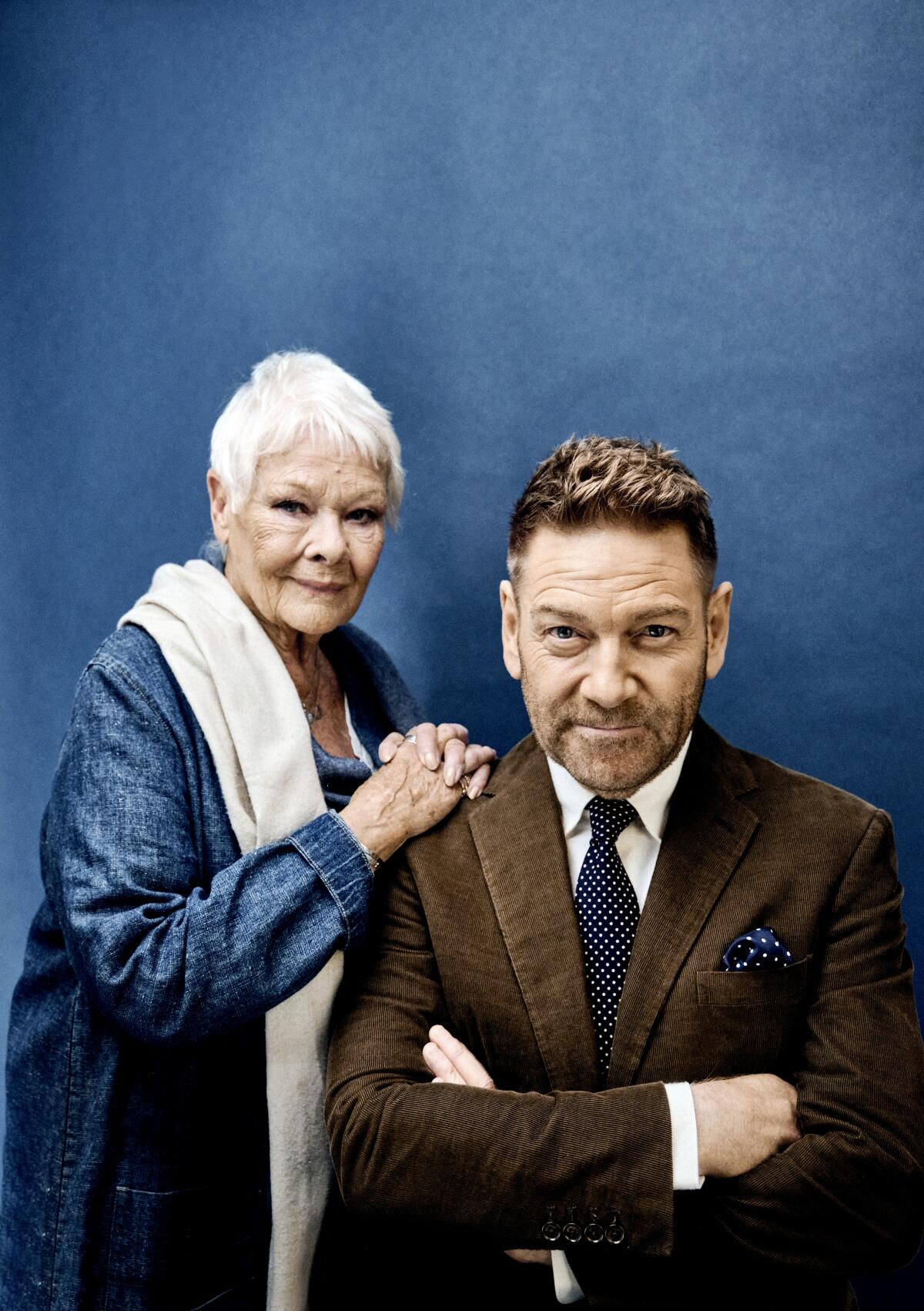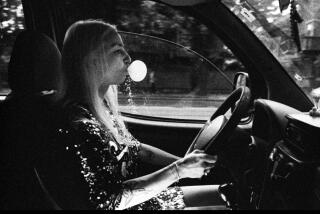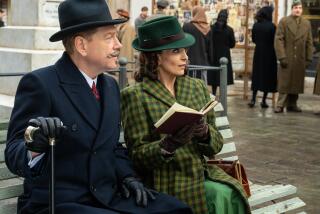How Judi Dench takes Kenneth Branagh’s breath away

A couple of years ago, Kenneth Branagh was driving to Judi Dench’s Surrey home to read her his screenplay and offer her the role of the grandmother for “Belfast,” his personal story about growing up in Northern Ireland in the 1960s during the sectarian strife of the Troubles. Dench and Branagh have worked together now 12 times, so there’s a shorthand and familiarity between them, a connection that Dench chalks up to them almost sharing a December birthday (“many years apart,” the 87-year-old Dench notes).
Still, Branagh, 61, remains a bit in awe of Dench, still remembering what it was like when he first worked with her on a 1987 BBC production of Ibsen’s “Ghosts” and he couldn’t quite fathom that this legend, this Dame Commander of the Order of the British Empire, was actually taking him seriously. (“Or at least she was doing a wonderful performance of treating me like an equal operator,” Branagh says, smiling.)
Thus, Branagh’s “Belfast” reading for Dench felt like an audition, like he was coming to Dench with his “pack on his back.” And as he was acting out the movie and putting every ounce of energy he had into the reading, in his mind, Branagh was picturing Dench sitting across from him, stroking a blue-eyed Persian cat like the Bond villain Blofeld, and saying, “So, Mr. Branagh ... you really think this is a movie ....”
“She has a very healthy, a very rigorous, and I would say savage, artistic judgment and artistic conscience,” Branagh says. He’s seated on a sofa in a London hotel room, and Dench is next to him. And when she hears Branagh’s description of her acumen, she bristles.
“I certainly don’t believe ‘savage,’” Dench says, frowning.
“I mean ‘savage’ in terms of rigorous,” Branagh, chastened, offers, walking the word back a bit.
Dench turns to him. “Was I savage when I gave you notes for ‘Much Ado About Nothing’?” Branagh casts his eyes downward. He knows where this is headed. “Well ...” he begins. But she cuts him off. “You wouldn’t stay for the notes!”
“We have had our run-ins about these kinds of things,” Branagh says. He circles back to his verbal trespass. “I would say ‘savagery’ in terms of being an artistic Puritan.” Dench nods, satisfied. “That is much nicer.” Branagh laughs. “Well, it’s in the same world!”
The whole hour-long conversation goes like this. I’ll ask a question, and the genial Branagh will answer with a polite earnestness, enunciating every word with peerless precision. And then Dench will tease him or correct the record or say something to make him laugh.
It has been this way between them from the beginning, since that long-ago production of “Ghosts.” The director tried to create and enforce what he thought was a proper atmosphere of tension on the set. Branagh, Dench and castmate Michael Gambon were seated around a dinner table, rehearsing a scene. Potatoes were being served. Instead of asking for one, Gambon demanded eight. Branagh and Dench lost it and were asked to leave the set for the day.
“I knew I could always work with Ken after that,” Dench says.
And she did, starring in Branagh’s 1989 feature film directorial debut, “Henry V,” which came a year after Dench directed Branagh in that stage version of “Much Ado About Nothing,” the production that, all these years later, has not been forgotten by either party.
“You can tell this story, Judi,” Branagh says, when I bring up the “notes” incident.
“I will tell this story,” Dench says, not needing his permission. “I was asked to direct ‘Much Ado About Nothing’ ...” “Which she did brilliantly,” Branagh interjects. Dench looks at him, annoyed at the praise. “Which I did,” she says, dryly.
“I loved doing it, but it’s very foreign for an actor to be a director,” Dench continues. “I don’t care for it much, because they all go off to the pub and don’t tell you where they’re going. I don’t like it. I don’t like it at all. I like being part of the bunch. But, anyway, I did it. And then I went to see it when they were on tour [with the play]. And Ken knew I was there — I’m not going to say how badly you behaved — and he left before I could give him my notes.”
Branagh says he left because he was terrified. He had defied Dench by adding a line into a scene for a cheap laugh — a good laugh, but a wrong laugh — and he knew he was going to get an earful. “Again, artistic Puritan No. 1, Judi Dench,” Branagh says. And though it has been 35 years, losing that line remains a painful subject.
“I took it out, I did,” Branagh says. “I mean, it broke my heart. It broke my heart, because I came up with all sorts of cobblers as to why it was probably all right, and I quoted Shakespearean clowns who probably improvised a bit. I had plenty of other laughs, legitimate laughs in a very brilliant comedy by a distinguished author. But I decided that that one was particularly delicious. I learned my lesson, and it was gone.”
“But only after I gave you that note I don’t know how many times,” Dench says, a twinkle in her eye.
The woman Dench plays in “Belfast” is modeled after Branagh’s grandmother, though it’s clear she isn’t far removed from Dench herself in her directness, fortitude and capacity for humor. “Jude,” as Branagh often calls her, shared many scenes with Jude Hill, the young actor (he was 10 at the time of filming) playing Buddy, Branagh’s precocious stand-in. “The two Judes,” Branagh calls them. “Young Jude and slightly less young Jude.”
“Decrepit Jude,” Dench says, laughing.
Their most memorable moment comes on a deserted bus when the two are returning from seeing “A Christmas Carol” and the grandmother shares her cherished memories of watching movies when she was a little girl. “Lost Horizon” was a favorite. “I used to think you could climb right inside the screen,” she tells Buddy, “and visit all those strange places.” When he asks if she ever visited the idyllic Shangri-La of “Lost Horizon,” the camera captures a wistful Dench answering, “There were no roads to Shangri-La from our part of Belfast.”
“There’s a compassion in that moment that Judi brings, and you see it in her beautiful, beautiful smile,” Branagh says.
It’s no surprise, given their history and her standing, that Branagh chose to end “Belfast” with a close-up of Dench. They did 12 takes, patiently working together to make each one a bit different until Branagh knew Dench nailed it. He went back to double-check the take and, listening to it, heard a strange noise. Branagh asked the sound mixer what happened. “That’s your intake of breath,” he was told.
“She was so bloody good, she had literally taken my breath away,” Branagh says. Dench lets out a hearty laugh. “We kept working, didn’t we?” she asks Branagh. “We didn’t settle. Never settle.” Branagh smiles. “And that’s why I keep asking you to be in my movies and pray that you’ll say yes.”
More to Read
From the Oscars to the Emmys.
Get the Envelope newsletter for exclusive awards season coverage, behind-the-scenes stories from the Envelope podcast and columnist Glenn Whipp’s must-read analysis.
You may occasionally receive promotional content from the Los Angeles Times.











